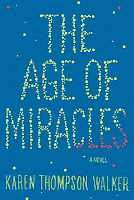All right, chickadees. It's time to have a serious discussion, by which I mean I'll talk and you listen. Sit yourselves down and settle in for a spell.
The Internet-at-Large would have you believe that this is something of a Western because it takes place in the California Gold Rush Era*. It (they?) would have you believe that this is a tale of two brothers who roam around Oregon and Northern California as hired guns. It (definitely not they) would have you believe that this is a thought-provoking story about brotherhood in its many forms. And it would be right on all accounts, although it takes place in this... how do I describe it...
This book has a Tone. It's not a bad tone, but it's... unexpected. Okay.
There are these two brothers - the Sisters Brothers, if you can't keep up (like me, most of the time) - and they roam around killing people what needs kilt for this boss dude. The book is all told from the second brother's point of view (literary term in blog post: check!), and the second brother is contemplative and somewhat unusual for a Sisters Brother in that he wants to quit this life and go run a general store upstate, but he also doesn't want to leave his brother to do the killin' on his own because a team: they are one.
And then after a couple of shoot-outs and some whoring and drinking and a lot of vomiting - so much vomiting! - they find the guy they're actually supposed to kill, but they don't want to because he's clearly not a bad dude and they can get in on this thing to help pull money out of the rivers of California (gold rush, remember? Jeez, keep up!).
So the book takes this turn for the decidedly chemically fascinating, which I was definitely NOT expecting.
And overall it was very sedate and matter-of-fact in tone, which was fascinating but also kept me from getting into the characters so much, and there's nothing I like better than dreaming about being Marion Holcombe and giving Frederick Fairlie a swift kick in the tuchus.
Then again, there were lines like this:
"At this piece of dramatic exposition, I could not help but roll my eyes. A length of intestine would not carry the weight of a child, much less a full grown man." (p. 124)Well played, Mr. DeWitt. Well played indeed.
8.5 of 11 Barrels of Purple Sludge
*The "California" part is an important distinction for those of us who grew up in Alaska and still think that the Gold Rush happened in 1898. Which it did, just not in California. Also, my state is bigger than your state.
















